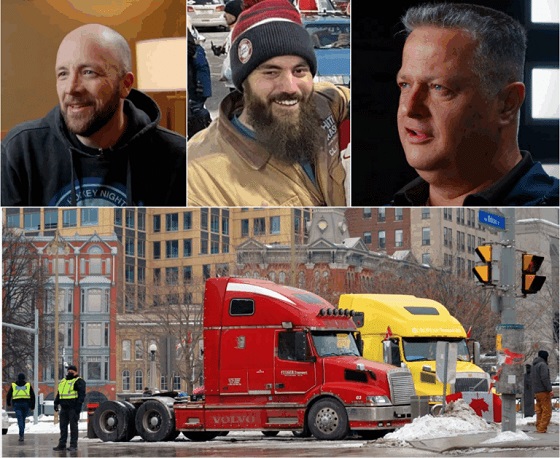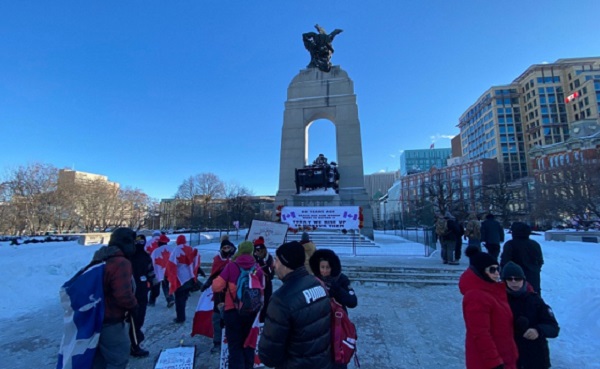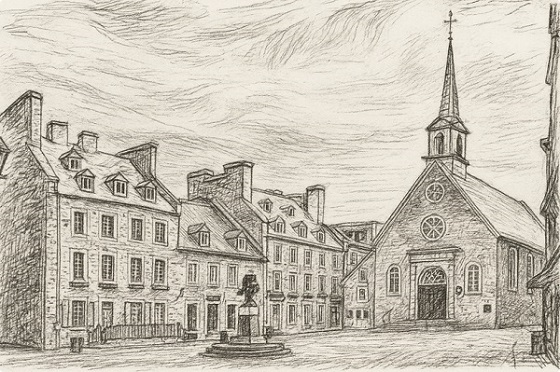COVID-19
The Persecution of Canada’s “Other” Freedom Convoy Truckers

While thousands of serious criminal cases across Canada are dropped merely due to delays, many Convoy-related prosecutions on trivial charges continue more than three-and-a-half years later. The cases of Freedom Convoy truckers (left to right) Bern Bueckert, Clayton McAllister and Csaba Vizi (whose Volvo is shown at bottom) are still not fully resolved. (Sources of photos: (top left and right) screenshots from documentary Unacceptable?; (top middle) ThankYouTruckers.Substack; (bottom) Donna Laframboise)
On September 8, three and a half years after the 2022 Freedom Convoy departed Ottawa, and five long, stressful months after his trial actually ended, Robert Dinel walked out of court a free man.
Dinel, a Quebec heavy equipment operator who’d behaved entirely peacefully during the protest over Covid restrictions, had been charged with mischief and obstruction of police. Court proceedings were repeatedly delayed — four times alone just this year — until judge Matthew Webber of the Ontario Court of Justice finally stayed the charges on the grounds that Dinel’s Charter rights to a timely trial had been violated.
For Dinel, it was a relief. For Canadians concerned about freedom and justice, his legal ordeal was yet another example of a system gone off the rails.
Most Canadians are aware of the trials of convoy leaders Tamara Lich and Chris Barber, which ended in conviction; they are to be sentenced in October. Few may realize that many more protestors were charged, most for the relatively innocuous infraction of mischief, and have had their cases drag on and on through the courts for more than three years.
The record of Canada’s legal system clearly shows that mischief charges are routinely withdrawn before scarce and expensive court time is expended on relative trivialities. But when it comes to the truckers, the Crown attorneys at the Ottawa courthouse – employees of the Government of Ontario, not the federal government – appear to have lost all perspective. They are on a mission. The sheer intensity of the prosecution of Convoy members looks less like the fair administration of justice than revenge upon people who dared protest the arbitrary and oppressive measures of the Covid years.
The initial police crackdown itself was a mess. Those arrested were passed from police officer to police officer. Officials writing up the paperwork had no direct knowledge of what had actually transpired; extra charges appear to have been tacked on willy nilly. In Dinel’s case, the prosecution doesn’t even know the identity of the tactical officer who pointed a gun at his head and hauled him out of his vehicle on February 18, 2022.
In a police processing trailer four hours after his arrest, Dinel received a medical assessment from a paramedic. Seated and hand-cuffed throughout, the five-foot-three Dinel calmly and repeatedly told police he was in no fit state to be making decisions and that he wanted to speak to a lawyer. “I want to know what I’m signing,” he insisted. But the police officers, who outnumbered him ten-to-one, kept pushing him to sign an undertaking that he wouldn’t return to the protest area. The fact he never got his phone call – that he was denied his Charter right “to retain and instruct [legal] counsel without delay” – should have stopped this case in its tracks. The Crown chose to pursue it, anyway.
A week after Dinel’s mother died in July 2023, he suffered the first of four strokes. In December 2023, one occurred in the courtroom. “My whole face just seized up,” he recalls. “I had another stroke. My whole face drooped, then the judge freaked right out.” An ambulance was summoned and his trial was adjourned. “I hate court,” says Dinel. “It’s hard, you know. It’s stressful, it’s exhausting.” Rather than staying the charges on compassionate grounds, the prosecution continued, with Dinel accompanied by a service dog.
Nova Scotia trucker Guy Meister spent hours in the same paddy wagon as Dinel the day they were arrested. After travelling from his Nova Scotia home to Ottawa for court appearances more than a dozen times – at considerable expense – in May of this year Meister was found guilty of mischief, but not of obstructing police. In late July, he was sentenced to 20 hours of community service, six months’ probation, and ordered to pay a $100 victim surcharge.
The trial for Windsor, Ontario trucker Csaba Vizi began just this month, the same day Robert Dinel’s charges were stayed. Video broadcast around the world in February 2022 shows him being assaulted by multiple police officers after he’d exited his truck and knelt down in the snow with his hands behind his head. None of those officers were themselves charged following this violence. None were forced to raise tens of thousands in lawyers’ fees, as Vizi has. Even protesters who have endured the stress of a trial and been acquitted have still not always walked free and clear, because the Crown has often insisted on filing appeals. As a result, defence lawyers routinely advise Freedom Convoy protesters that their legal nightmare isn’t actually over until an additional 30 days have come and gone. In one instance, the Crown waited until the last afternoon of the last permissible day to file its appeal.
These are just a few examples of what’s been going on in Canada’s justice system, one already beset by long delays for cases involving far more serious crimes. Credible news reports suggest that the majority of criminal cases in Ontario aren’t even making it to trial, with sexual assault
charges dropped because of delays. Yet the Convoy prosecutions continue.
Many people insist Covid is over, that we should all move on. But the legal persecution of the truckers who bravely protested government overreach in the bitter winter of early 2022 is far from over.
Donna Laframboise is an independent journalist and photographer. A former vice-president of the Canadian Civil Liberties Association, she is the author of Thank You, Truckers! Canada’s Heroes & Those Who Helped Them.
The original, full-length version of this article was recently published in C2C Journal.
COVID-19
Canadian veteran challenges conviction for guarding War Memorial during Freedom Convoy

From LifeSiteNews
When the convoy first came to Ottawa, allegations were floated that the memorial had been desecrated. After learning of this, Evely quickly organized a group of veterans to stand guard around the clock to protect the area.
A Canadian veteran appealed to the Ontario courts after he was convicted for organizing a guard around the National War Memorial during the Freedom Convoy.
In an October press release, the Justice Centre for Constitutional Freedoms (JCCF) announced that an appeal has been filed in the Ontario Court of Appeals on behalf of Master Warrant Officer (Ret’d) Jeffrey Evely over his conviction for mischief and obstructing police while on his way to guard the Ottawa War Memorial during the 2022 Freedom Convoy.
“By locking down large sections of downtown Ottawa, the police were effectively preventing all civilians from accessing public areas and greatly exceeded their powers under the common law,” constitutional lawyer Chris Fleury explained.
“This case raises issues that have implications for protests across the province and the country. We are hopeful that the Ontario Court of Appeal will agree and grant leave to appeal,” he added.
The appeal argues that police overstepped their authority in their response to the 2022 protest of COVID mandates. Police actions at the time included locking down the Ottawa core, establishing checkpoints, and arresting protesters.
In September 2024, Everly was convicted of mischief and obstruction after his involvement in the 2022 Freedom Convoy, which protested COVID mandates by gathering Canadians in front of Parliament in Ottawa.
As LifeSiteNews previously reported, when the convoy first came to Ottawa, allegations were floated that the memorial had been desecrated. After learning of this, Evely quickly organized a group of veterans to stand guard around the clock to protect the area.
However, under former Prime Minister Justin Trudeau’s use of the Emergencies Act, many parts of downtown Ottawa were blocked to the public, and a vigilant police force roamed the streets.
It was during this time that Evely was arrested for entering a closed off section of downtown Ottawa during the early hours of February 19, 2022. He had been on his way to take the 4:25 a.m. shift protecting the Ottawa War Memorial.
As Evely walked to the memorial, he was allegedly told to stop by police. According to the police, Evely “ran for a short distance before being confronted by two additional police officers.”
He was forcibly pushed to the ground, landing face first. The veteran was then arrested and charged with mischief and obstructing police.
At the time, the use of the EA was justified by claims that the protest was “violent,” a claim that has still gone unsubstantiated.
In fact, videos of the protest against COVID regulations and shot mandates show Canadians from across the country gathering outside Parliament engaged in dancing, street hockey, and other family-friendly activities.
Indeed, the only acts of violence caught on video were carried out against the protesters after the Trudeau government directed police to end the protest. One such video showed an elderly women being trampled by a police horse.
While the officers’ actions were originally sanctioned under the EA, Federal Court Justice Richard Mosley ruled that Trudeau was “not justified” in invoking the EA, forcing Crown prosecutors to adopt a different strategy.
Now, Crown prosecutors allege that the common law granted police the authority to stop and detain Evely, regardless of the EA.
However, Evely and his lawyers have challenged this argument under section 9 of the Canadian Charter of Rights and Freedoms, insisting that his “arrest and detention were arbitrary.”
Earlier this month, Freedom Convoy organizers Tamara Lich and Chris Barber were sentenced to 18-month house arrest after a harrowing 25-month trial process. Many have condemned the sentence, warning it amounts to “political persecution” of those who stand up to the Liberal government.
COVID-19
Freedom Convoy leader Tamara Lich says ‘I am not to leave the house’ while serving sentence

From LifeSiteNews
‘I was hoping to be able to drop off and pick up my grandsons from school, but apparently that request will have to go to a judge’
Freedom Convoy leader Tamara Lich detailed her restrictive house arrest conditions, revealing she is “not” able to leave her house or even pick up her grandkids from school without permission from the state.
Lich wrote in a X post on Wednesday that this past Tuesday was her first meeting with her probation officer, whom she described as “fair and efficient,” adding that she was handed the conditions set out by the judge.
“I was hoping to be able to drop off and pick up my grandsons from school, but apparently that request will have to go to a judge under a variation application, so we’ll just leave everything as is for now,” she wrote.
Lich noted that she has another interview with her probation officer next week to “assess the level of risk I pose to re-offend.”
“It sounds like it’ll basically be a questionnaire to assess my mental state and any dangers I may pose to society,” she said.
While it is common for those on house arrest to have to ask for permission to leave their house, sometimes arrangements can be made otherwise.
On October 7, Ontario Court Justice Heather Perkins-McVey sentenced Lich and Chris Barber to 18 months’ house arrest after being convicted earlier in the year convicted of “mischief.”
Lich was given 18 months less time already spent in custody, amounting to 15 1/2 months.
As reported by LifeSiteNews, the Canadian government was hoping to put Lich in jail for no less than seven years and Barber for eight years for their roles in the 2022 protests against COVID mandates.
Interestingly, Perkins-McVey said about Lich and Barber during the sentencing, “They came with the noblest of intent and did not advocate for violence.”
Lich said that her probation officer “informed me of the consequences should I breach these conditions, and I am not to leave the house, even for the approved ‘necessities of life’ without contacting her to let her know where I’ll be and for how long,” she wrote.
“She will then provide a letter stating I have been granted permission to be out in society. I’m to have my papers on my person at all times and ready to produce should I be pulled over or seen by law enforcement out and about.”
Lich said that the probation officer did print a letter “before I left, so I could stop at the optometrist and dentist offices on my way home.”
She said that her official release date is January 21, 2027, which she said amounts to “1,799 days after my initial arrest.”
As reported by LifeSiteNews, Lich, reflecting on her recent house arrest verdict, said she has no “remorse” and will not “apologize” for leading a movement that demanded an end to all COVID mandates.
LifeSiteNews reported that Conservative Party leader Pierre Poilievre offered his thoughts on the sentencing, wishing them a “peaceful” life while stopping short of blasting the sentence as his fellow MPs did.
In early 2022, the Freedom Convoy saw thousands of Canadians from coast to coast come to Ottawa to demand an end to COVID mandates in all forms. Despite the peaceful nature of the protest, Trudeau’s government enacted the never-before-used Emergencies Act (EA) on February 14, 2022.
-

 Alberta18 hours ago
Alberta18 hours agoFrom Underdog to Top Broodmare
-

 International1 day ago
International1 day agoPrince Andrew banished from the British monarchy
-

 Business1 day ago
Business1 day ago“We have a deal”: Trump, Xi strike breakthrough on trade and fentanyl
-

 Business2 days ago
Business2 days agoCanada’s attack on religious charities makes no fiscal sense
-

 Alberta1 day ago
Alberta1 day agoProvince orders School Boards to gather data on class sizes and complexity by Nov 24
-

 Bruce Dowbiggin2 days ago
Bruce Dowbiggin2 days agoGet Ready: Your House May Not Be Yours Much Longer
-

 Crime1 day ago
Crime1 day agoCanada Seizes 4,300 Litres of Chinese Drug Precursors Amid Trump’s Tariff Pressure Over Fentanyl Flows
-

 National1 day ago
National1 day agoWatchdog Presses Ottawa to Release Hidden Lobbying Rulings









